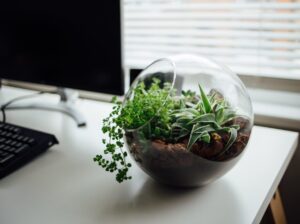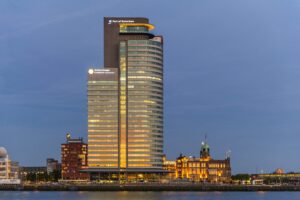

4 tips for a healthier workplace – at home or in the office
A while ago we asked you via LinkedIn about the most important aspects of healthy buildings. The reactions poured in, and now it’s time to put everything together. The WELL experts at CFP got down to work with the results of the poll and have come up with 4 tips for a healthier workplace – both in the office and at home.
The results of the poll

In a post-coronavirus world, this should come as no surprise: 56% of respondents consider air quality the most important feature of healthy buildings. Temperature is in second place, at 18% of the votes, with quality of light coming in a close third. And 9% of those who voted consider acoustics the most important indicator of a healthy building. But what do the figures say about these different aspects? And what impact do they have on your productivity? We list some tips for healthy working – things you can keep in mind whether you work from home, or in the office.
1. Fresh air increases productivity and reduces absenteeism
Working in a well-ventilated room can increase productivity by up to 29%. By the same token, a lack of fresh air contributes to 35% of sick leave. These figures speak for themselves. So always make sure you work in a well-ventilated area. Measuring the CO2 levels in the room where you work can be a good indicator of the air quality. In many cases where there is insufficient ventilation in a room, you will notice it yourself (in the form of wooziness, fatigue, etc.). But you may not be aware that the reason you feel this way is because the air quality is not good. Fresh air is therefore one of the most important elements of healthy buildings.
2. A workplace that is too hot or too cold makes you less active
We all know the feeling: working in a hot office, you’re sweating, distracted, and your mind keeps wandering. People often think that you only become less productive in the heat, but this is also true when it is too cold. When the temperature is too warm, you become 15% less productive; but when it’s cold, the loss of productivity is around 14%. Experiment to find the ideal temperature for you to work in and adjust your thermostat accordingly.
3. Working by a window makes you sleep better
In the poll, fluorescent tubes are explicitly named as a disturbance. And it does make quite a difference whether you are sitting by a window (in daylight) or not. People who work close to a window, and so are exposed to natural light in their workday, sleep an average of 46 minutes longer than those who sit further away from a window. And that in turn has a positive effect on productivity. That means: put your desk near a window.
4. Good acoustics improve concentration
Nothing is as irritating as disturbing sounds around you. It affects your concentration, but the figures also reveal a link between acoustics and stress. Noise-cancelling headphones can help improve acoustics. And for others, background music helps. For example, on Spotify there are various playlists available that have been compiled to help increase concentration. A calming room is thus an important factor in healthy buildings.






